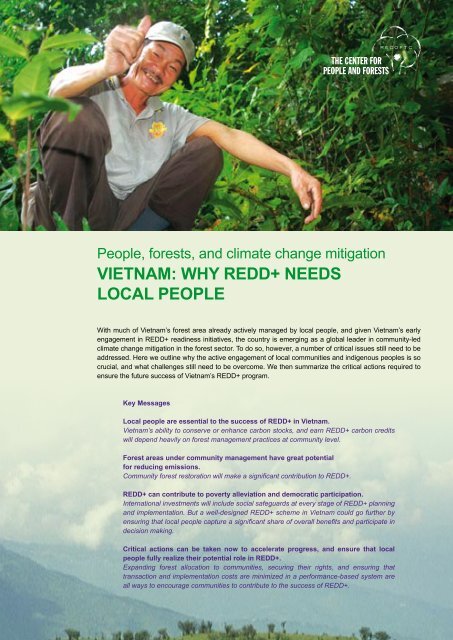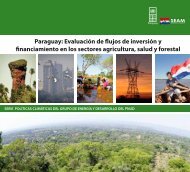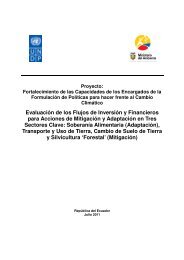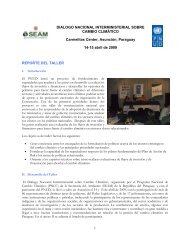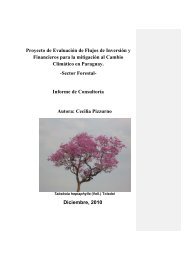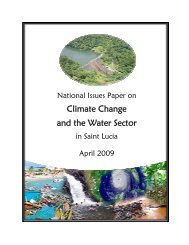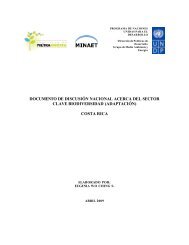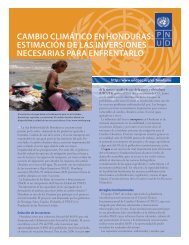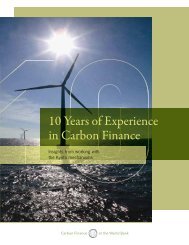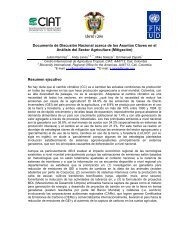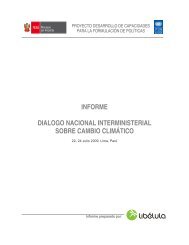VieTnam: why redd+ needs local people - UNDPCC.org
VieTnam: why redd+ needs local people - UNDPCC.org
VieTnam: why redd+ needs local people - UNDPCC.org
Create successful ePaper yourself
Turn your PDF publications into a flip-book with our unique Google optimized e-Paper software.
PROGRESS ON REDD MADE AT COPENHAGENAlthough the international community failed to reach a binding REDDagreement at the end of 2010, this was due to the lack of wider agreementon emission reduction targets and financing mechanisms. Negotiationson the overall climate change agreement, and a specific agreement onREDD continue.A number of key issues are extremely likely to be part of REDD when it isfinally agreed. These include:• Expanding the scope of REDD to REDD+, to embrace forestoperations that do more good, as well as those that do less harm• Articulating key environmental and social safeguards that include:° No conversion of natural forests to plantations° Reference to the UN Declaration of Rights on IndigenousPeoples (UNDRIP)° Full and effective participation of <strong>local</strong> <strong>people</strong> in planning andimplementationThe following issues still need to be resolved:• REDD+ financing and benefit sharing• Methodologies for monitoring, reporting, and verification (MRV)• Speed, scale, and strategy for implementationVietnam, REDD+, and Local PeopleWith <strong>local</strong> <strong>people</strong> already playing a significant role in managing Vietnam’s forests, the future success ofREDD+ depends heavily on their active engagement. Degraded forests under community management offergreat potential to deliver the carbon stock increases so urgently needed for climate change mitigation.While negotiations on REDD+ (and a wider climate change agreement) continue, Vietnam is f<strong>org</strong>ing aheadwith its preparations. Under the UN-REDD program, a pilot project in Lam Dong province is already testingREDD+ mechanisms and strengthening capacities at the sub-national level.In order for <strong>local</strong> <strong>people</strong> to engage actively, REDD+ must provide them with clear and fair benefits,and make sure they are able to participate throughout decision-making and implementation processes.The international REDD+ mechanism will include several social safeguards designed to ensure this.However, the Government of Vietnam has the potential to develop a national REDD+ mechanism that goesfurther to address some of the country’s most pressing social <strong>needs</strong>. For example, a well-designed programcould contribute to the national poverty reduction strategy as well as to the national policy on democraticparticipation.Why <strong>local</strong> <strong>people</strong> are essentialForest ownership in VietnamState companies 16.1%Protected areamanagementboards 33.5%Outside of protected area management boards, <strong>local</strong> <strong>people</strong> are thelargest forest tenure group in Vietnam. Forests held under <strong>local</strong> tenure,either by households or communities, amount to a total of around3.3 million hectares – over a quarter of the country’s total forest area.A further 19% of forest area, some 2.6 million hectares, is under thetemporary management of communal authorities, but is expected to bepartially or wholly allocated to <strong>local</strong> <strong>people</strong>.Not yetallocated 19.3%Other actors 6.0%Source: http://www.kiemlam.<strong>org</strong>.vnCommunities 25.1%With these numbers, there is no doubt <strong>local</strong> <strong>people</strong> have a vital role toplay in forest management; they will be an essential partner in REDD+implementation.Local <strong>people</strong> will be directly responsible for delivering reduceddeforestation and forest degradation results in the areas under theircontrol. Their management will be essential to realize the potentialto maintain and possibly enhance carbon stocks, as well as provide acost-effective means to monitor and verify changes.
Great potential for active contributionAs most forest areas allocated to <strong>local</strong> <strong>people</strong> are relatively poor in quality, they have greater potentialfor rapid carbon stock increases than do better-quality forests such as those predominant in protectedareas. As REDD+ includes the enhancement of forest carbon stocks, reforestation and forest restoration bycommunities will make a significant contribution to the removal of greenhouse gases.Community monitoring can be a cost-effective alternative (and supplement) tointensive forest inventories conducted by external experts. Experience fromcommunity-managed forests in Nepal and India shows that with basic training,<strong>local</strong> <strong>people</strong> can assess changes in carbon stocks in their forests. 1 The resultsof such accounting can be reported to state agencies responsible for furthercalculations at higher levels (e.g. district or provincial). In a national REDD+program, where ground measurements of forest biomass must be carried out ona regular basis across the country, monitoring by <strong>local</strong> <strong>people</strong> provides an efficientand relatively inexpensive way of collecting data.Although many communities have rights to manage forestland, community forestryis not yet formalized on a large scale. The ‘package’ of procedures and institutionsrequired for this has already been designed. It includes village forest regulations,benefit-sharing procedures, community-based law enforcement, and communityforest management and protection funds. Several projects have successfullydemonstrated that collaboration between state agencies and <strong>local</strong> <strong>people</strong>, a keytenet of community forestry, can improve forest management. Experience alsoshows that <strong>local</strong> forest resources are often better protected and managed bycommunities than by State Forest Companies 2 or protected area managementboards, despite considerable subsidies and support from the State to the latter.Quality of forest allocated to communitiesunder CFM Pilot ProjectArea (ha)PercentBare land 2,383 14.1%Poor forest 10,411 61.7%Medium forest 1,735 10.3%Rich forest 242 1.4%Mixedtimber-bamboo2,004 11.9%Plantation 88 0.5%Total 16,863 100%Source: adapted from Community ForestryPilot ProgramGoing beyond social safeguards – adding value to REDD+ in VietnamAlthough social and environmental safeguards for REDD+ are not yet finalized, they were a key elementof the Copenhagen negotiations. For the Government of Vietnam to receive REDD+ finance from theinternational community, <strong>local</strong> <strong>people</strong> must be involved at every stage of planning and implementation.Their direct and transparent involvement is essential to build trust and confidence, and thus is an essentialprerequisite for REDD+ to succeed.In addition to delivering forest data and results, <strong>local</strong> <strong>people</strong>’s engagement in REDD+ also offers an opportunityto help address pressing social issues. Income from REDD+ could make an important contribution to povertyreduction among forest-dependent <strong>people</strong>. Data from Nepal indicates that at a carbon price of $US5 pertonne, revenue from forest carbon for <strong>local</strong> <strong>people</strong> may comprise some 30% of the net financial benefits fromthe forests they manage. 3 During the past fifteen years, Vietnam has made significant progress in reducingpoverty nationally, but much less in tackling rural poverty. The financial benefits from REDD may providemuch-needed supplementary income to rural <strong>people</strong> whilst enabling them to manage, and live in harmonywith, their forests.Globally, the mechanism for delivering financial benefits to <strong>local</strong> <strong>people</strong> remains to be developed. However,the Government of Vietnam is one of the first to take concrete steps towards developing an equitable andcost-effective benefit distribution system. 4Importantly, complementary payments to <strong>local</strong> <strong>people</strong> will be needed before performance-based paymentsare received at the national level. They would therefore be an important element of readiness activitiesfunded under UN-REDD and other mechanisms. These payments should be independent of the revenuegenerated by the achievement of future REDD+ targets, and instead focus on directly paying <strong>local</strong> <strong>people</strong>for monitoring work and other tangible activities that contribute to REDD+ readiness.1Reducing Carbon Emissions through Community-managed Forests in the Himalayas, Banskota K, B.S, Karky and M. Skutsch, ICIMOD 20072For example, see The Local Outcomes of Forest Devolution: Evidence from Dak Lak, Tran, T. N., Nguyen, T. Q., and Sikor. T. August 20033The Cost of Carbon Abatement Through Community Forest Management in Nepal Himalaya, B. Karky and M. Skutsch, March 20094Design of a REDD Compliant Benefit Distribution System for Vietnam, UNREDD Program, January 2010
Involving <strong>local</strong> <strong>people</strong> in REDD+ is aligned with the Government of Vietnam’s democraticparticipation policy, 5 which emphasizes their rights to be informed and consulted, and to participate indecision-making processes.In addition, their active participation will help ensure that social safeguards for REDD+ are realized.One frequently voiced concern is that REDD+ may lead to rights violations of poor and marginalizedgroups. Their meaningful engagement, including securing Free, Prior and Informed Consent (FPIC) atevery stage of the process, will be an important indicator that <strong>local</strong> <strong>people</strong>’s rights are being respectedand their interests, <strong>needs</strong>, and aspirations met.The way forward: towards full communityparticipation in REDD in VietnamThere are a number of critical actions the Government of Vietnam can take to accelerate progress andovercome challenges to ensure that <strong>local</strong> <strong>people</strong> are able to play a full and active role in the successof REDD+ in Vietnam.• Providing secure rights to forests: For <strong>local</strong> <strong>people</strong> to benefit from REDD+, secure and strong rightsto forests are a pre-requisite. Above all, <strong>local</strong> <strong>people</strong> holding rights to forestland need to be certainthat they will share in the benefits derived from their contribution to improving forest management.• Accelerating the allocation of forestland: The Government of Vietnam <strong>needs</strong> to speed up thetransfer of unallocated forest to <strong>local</strong> <strong>people</strong>. Currently, almost one out of five hectares remainsin legal limbo. Rapid allocation could boost community forestry to almost double the current areawithin a few years.• Effectively enforcing the law: For REDD+ to work effectively, the legal framework <strong>needs</strong> to apply toall forest owners in the same way. Law enforcement has to recognize the rights of <strong>local</strong> <strong>people</strong> asmuch as the rights of other forest managers.• Clarifying the functions of state agencies: A clear separation between the state agencies managing forestsand monitoring forest management performance is required. The state agencies competing with <strong>local</strong><strong>people</strong> for REDD+ funds must be different from those in charge of monitoring and law enforcement.• Minimizing transaction costs: Forests managed by <strong>local</strong> <strong>people</strong> are often small in size. The bundlingof community forests at the commune or district level should be considered to reduce costs andensure equitable benefits.• Providing interim incentives for <strong>local</strong> communities: Until performance-based payments aredisbursed through REDD+, interim support must be available. This support may come in twoforms: advance payments (e.g. conditional savings books), or direct payments to <strong>local</strong> <strong>people</strong> fortheir contribution towards REDD+ readiness such as regular, simple forest inventories and forestrestoration activities.AcknowledgementsNguyen Quang Tan is RECOFTC’s Country Program Coordinator in Vietnam.Thomas Sikor is a Reader in Development Studies at the University of East AngliaBen Vickers is a Senior Program Officer at RECOFTC and its Climate Change Focal PointThomas Enters is Senior Manager of RECOFTC’s Regional and Country Analysis and Support Unit5Decree 29/1998/ND-CP dated 15 May 1998 and Ordinance 34/2007/PL-UBTVQH11 dated 20 April 2007RECOFTCPO Box 1111, Kasetsart Post OfficeBangkok 10903, ThailandTel: +66 (0)2 940 5700Fax: +66 (0)2 561 4880Email: info@recoftc.<strong>org</strong>Website: www.recoftc.<strong>org</strong>


